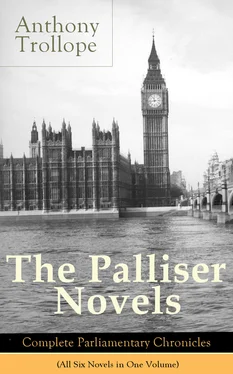“Mr. Finn,” said she, smiling as she spoke, “I am sure that you did not mean it, but you were uncourteous to my friend Mr. Kennedy.”
“Who? I? Was I? Upon my word, I didn’t intend to be uncourteous.”
“If I had thought you had intended it, of course I could not tell you of it. And now I take the liberty;—for it is a liberty—”
“Oh no.”
“Because I feel so anxious that you should do nothing to mar your chances as a rising man.”
“You are only too kind to me,—always.”
“I know how clever you are, and how excellent are all your instincts; but I see that you are a little impetuous. I wonder whether you will be angry if I take upon myself the task of mentor.”
“Nothing you could say would make me angry,—though you might make me very unhappy.”
“I will not do that if I can help it. A mentor ought to be very old, you know, and I am infinitely older than you are.”
“I should have thought it was the reverse;—indeed, I may say that I know that it is,” said Phineas.
“I am not talking of years. Years have very little to do with the comparative ages of men and women. A woman at forty is quite old, whereas a man at forty is young.” Phineas, remembering that he had put down Mr. Kennedy’s age as forty in his own mind, frowned when he heard this, and walked about the room in displeasure. “And therefore,” continued Lady Laura, “I talk to you as though I were a kind of grandmother.”
“You shall be my great-grandmother if you will only be kind enough to me to say what you really think.”
“You must not then be so impetuous, and you must be a little more careful to be civil to persons to whom you may not take any particular fancy. Now Mr. Kennedy is a man who may be very useful to you.”
“I do not want Mr. Kennedy to be of use to me.”
“That is what I call being impetuous,—being young,—being a boy. Why should not Mr. Kennedy be of use to you as well as any one else? You do not mean to conquer the world all by yourself.”
“No;—but there is something mean to me in the expressed idea that I should make use of any man,—and more especially of a man whom I don’t like.”
“And why do you not like him, Mr. Finn?”
“Because he is one of my Dr. Fells.”
“You don’t like him simply because he does not talk much. That may be a good reason why you should not make of him an intimate companion,—because you like talkative people; but it should be no ground for dislike.”
Phineas paused for a moment before he answered her, thinking whether or not it would be well to ask her some question which might produce from her a truth which he would not like to hear. Then he did ask it. “And do you like him?” he said.
She too paused, but only for a second. “Yes,—I think I may say that I do like him.”
“No more than that?”
“Certainly no more than that;—but that I think is a great deal.”
“I wonder what you would say if any one asked you whether you liked me,” said Phineas, looking away from her through the window.
“Just the same;—but without the doubt, if the person who questioned me had any right to ask the question. There are not above one or two who could have such a right.”
“And I was wrong, of course, to ask it about Mr. Kennedy,” said Phineas, looking out into the Square.
“I did not say so.”
“But I see you think it.”
“You see nothing of the kind. I was quite willing to be asked the question by you, and quite willing to answer it. Mr. Kennedy is a man of great wealth.”
“What can that have to do with it?”
“Wait a moment, you impetuous Irish boy, and hear me out.” Phineas liked being called an impetuous Irish boy, and came close to her, sitting where he could look up into her face; and there came a smile upon his own, and he was very handsome. “I say that he is a man of great wealth,” continued Lady Laura; “and as wealth gives influence, he is of great use,—politically,—to the party to which he belongs.”
“Oh, politically!”
“Am I to suppose you care nothing for politics? To such men, to men who think as you think, who are to sit on the same benches with yourself, and go into the same lobby and be seen at the same club, it is your duty to be civil both for your own sake and for that of the cause. It is for the hermits of society to indulge in personal dislikings,—for men who have never been active and never mean to be active. I had been telling Mr. Kennedy how much I thought of you,—as a good Liberal.”
“And I came in and spoilt it all.”
“Yes, you did. You knocked down my little house, and I must build it all up again.”
“Don’t trouble yourself, Lady Laura.”
“I shall. It will be a great deal of trouble,—a great deal, indeed; but I shall take it. I mean you to be very intimate with Mr. Kennedy, and to shoot his grouse, and to stalk his deer, and to help to keep him in progress as a liberal member of Parliament. I am quite prepared to admit, as a friend, that he would go back without some such help.”
“Oh;—I understand.”
“I do not believe that you do understand at all, but I must endeavour to make you do so by degrees. If you are to be my political pupil, you must at any rate be obedient. The next time you meet Mr. Kennedy, ask him his opinion instead of telling him your own. He has been in Parliament twelve years, and he was a good deal older than you when he began.” At this moment a side door was opened, and the red-haired, red-bearded man whom Phineas had seen before entered the room. He hesitated a moment, as though he were going to retreat again, and then began to pull about the books and toys which lay on one of the distant tables, as though he were in quest of some article. And he would have retreated had not Lady Laura called to him.
“Oswald,” she said, “let me introduce you to Mr. Finn. Mr. Finn, I do not think you have ever met my brother, Lord Chiltern.” Then the two young men bowed, and each of them muttered something. “Do not be in a hurry, Oswald. You have nothing special to take you away. Here is Mr. Finn come to tell us who are all the possible new Prime Ministers. He is uncivil enough not to have named papa.”
“My father is out of the question,” said Lord Chiltern.
“Of course he is,” said Lady Laura, “but I may be allowed my little joke.”
“I suppose he will at any rate be in the Cabinet,” said Phineas.
“I know nothing whatever about politics,” said Lord Chiltern.
“I wish you did,” said his sister,—”with all my heart.”
“I never did,—and I never shall, for all your wishing. It’s the meanest trade going I think, and I’m sure it’s the most dishonest. They talk of legs on the turf, and of course there are legs; but what are they to the legs in the House? I don’t know whether you are in Parliament, Mr. Finn.”
“Yes, I am; but do not mind me.”
“I beg your pardon. Of course there are honest men there, and no doubt you are one of them.”
“He is indifferent honest,—as yet,” said Lady Laura.
“I was speaking of men who go into Parliament to look after Government places,” said Lord Chiltern.
“That is just what I’m doing,” said Phineas. “Why should not a man serve the Crown? He has to work very hard for what he earns.”
“I don’t believe that the most of them work at all. However, I beg your pardon. I didn’t mean you in particular.”
“Mr. Finn is such a thorough politician that he will never forgive you,” said Lady Laura.
“Yes, I will,” said Phineas, “and I’ll convert him some day. If he does come into the House, Lady Laura, I suppose he’ll come on the right side?”
“I’ll never go into the House, as you call it,” said Lord Chiltern. “But, I’ll tell you what; I shall be very happy if you’ll dine with me tomorrow at Moroni’s. They give you a capital little dinner at Moroni’s, and they’ve the best Château Yquem in London.”
Читать дальше












